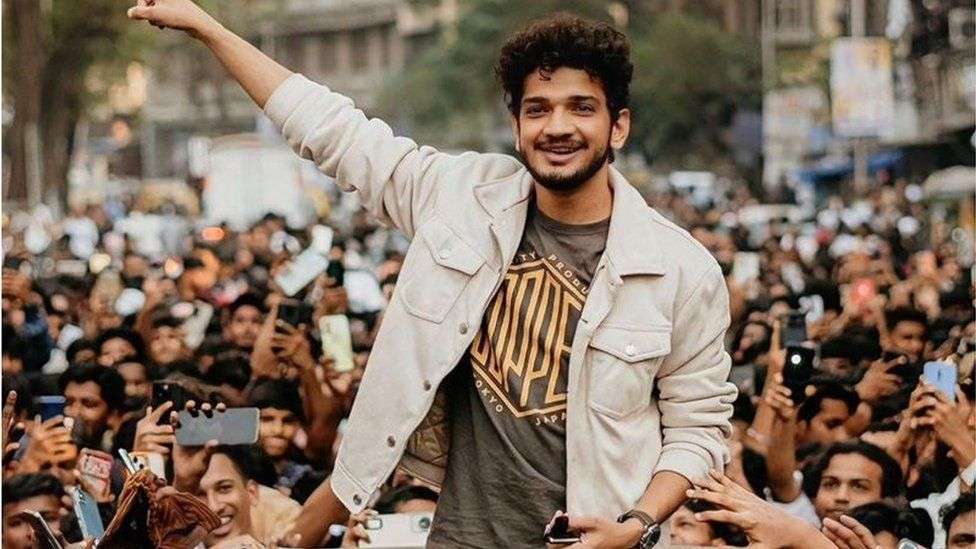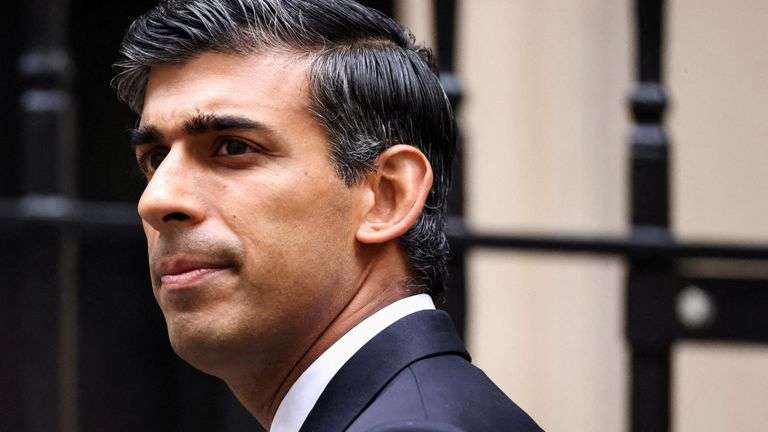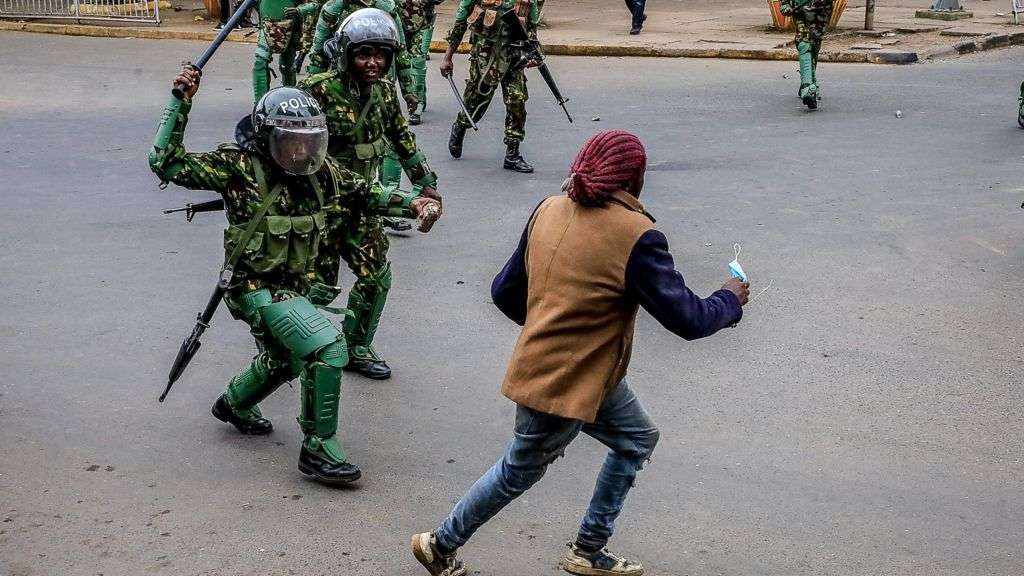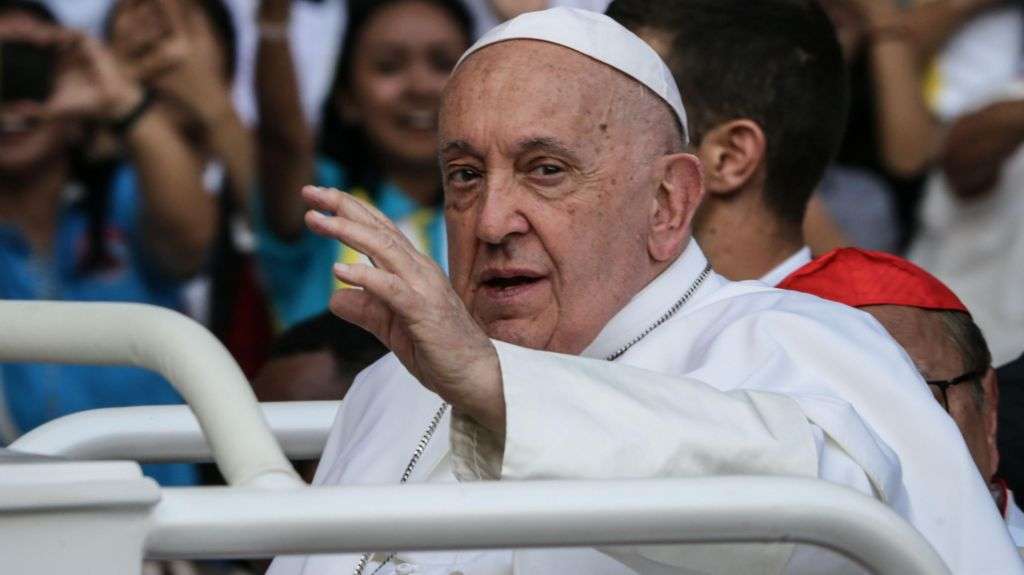"People usually apologise after cracking jokes," Indian stand-up comic Munawar Faruqui says in an episode of Bigg Boss, a popular reality TV show.
"But in my case, it's best if I do it in advance."
His humour wasn't missed on the millions of Indians watching the programme, a homegrown version of UK's Big Brother. In the show, 21 contestants are isolated in a custom-built house, where they are filmed around the clock and are evicted through weekly audience votes.
Within the eclectic mix of contestants, Faruqui stood out. A Muslim, he was arrested in 2021 on charges of hurting religious sentiments of Hindus for a joke he didn't crack. He spent five weeks in jail before a court gave him bail.
Three years on, the 32-year-old has won the popular reality programme, taking home a whopping 5m rupees ($60,160; £47,455).
On Monday, a sea of people gathered in Faruqui's neighbourhood Dongri - a Muslim ghetto just outside of Mumbai city - to welcome him, a kind of reception usually reserved for film stars. His name has been trending all week and social media is awash with his memorable one-liners from the show.
Not everyone's happy though. An anchor of a popular Hindi TV channel said it was "worrying, distressing and disappointing" that the country, including millions of Hindus, was celebrating a comic who "started his career by insulting Hindu gods and religion".
Many say the way Faruqui has reinvented himself from being among India's "most hated" young performers to a "darling of the masses" using unconventional ways deserves recognition.
"It imbued his life with an arc of struggle," says political scientist Asim Ali. "He came out of jail, was subject to a vicious media onslaught but then returned to achieve a significant pan India level of celebrity."
But how did he do it? The answer lies in Faruqui's life itself.
Coming from a small city in the western state of Gujarat, Faruqui's childhood was beset with tragedies. His mother died by suicide when he was just a boy, his father faced violence during the deadly 2002 religious riots - the comic once said he was stuck at home for 12 days during a curfew. Like millions, he moved to Mumbai, the "city of dreams", in his teens to give life a chance, but had to do odd jobs for years before he could make it big.
In Bigg Boss, Faruqui didn't shy away from these realities but constantly embraced his underdog existence, speaking a language in which ordinary people dream.
"I couldn't have possibly said no to Bigg Boss, this fancy life and house," he teasingly tells other contestants.
"I come from Dongri. In Bigg Boss, you are thrown out if you don't get votes, but in our tiny house, you are thrown out if you move even an inch extra in your sleep."
His ability to easily connect with masses shone through even during his stand-up years.
On stage, Faruqui carried the air of a slightly bored college student with a dark sense of humour. His attitude veered from playful unconcern to cool indifference, as he told macabre jokes about surviving riots and poked fun at clichés and stereotypes about Muslims. He was an inconsistent performer, but could be thrilling when he got it right, his provocations amusing and unsettling at the same time. These qualities were also present in Faruqui's rap music, which he made on the side.
"I evoke my past to express how proud I feel about my growth. It's never for sympathy but just to tell people I have come this far," he once said.
While his whimsy won him scores of fans, it couldn't protect him from what lay ahead. In 2021, he was kicking off a 14-city tour with a show in the central city of Indore when a leader of a local Hindu hardline group accused him of "insulting" Hindu religious sentiments. Faruqui and four others were arrested and charged with outraging religious feelings.
The case sparked massive outrage - eyewitnesses told reporters that Faruqui had not cracked any jokes relating to religion when he was picked up, and that he hadn't even started his routine when the show was interrupted. The police later also admitted they had no evidence that the comic had made the offending joke.
Yet, Faruqui spent 35 days in jail. After his release, he tried returning to comedy but dozens of his shows were cancelled following protests from Hindu groups. In December 2021, he announced he was quitting comedy. "Hate has won, artist has lost. I'm done," he wrote in a poignant Instagram post.
Two months later, Faruqui decided to move in a new direction and participated in a reality TV show called Lock Up. He described it as a "cleanse", an opportunity to rejuvenate his image and liberate from pre-existing assumptions. "I never wanted to be controversial, they made me so. I was happy doing comedy," he told a newspaper.
But it was an odd choice. The show featured "16 controversial celebrities" who spent 72 days locked up in a rowdy mock jail and was hosted by Kangana Ranaut, a popular Bollywood actor who often makes headlines for her anti-Muslim comments.
Faruqui's public persona also underwent a change. While dark humour with a political bent defined his work on stage, on TV he was more deliberate and self-aware, choosing to stay clear of questions about religion and identity. There was still drama, of course, but about his personal life - in one of the most popular episodes, he revealed he had been in a loveless marriage for many years and had a son. Audiences, many of whom had shunned him until now, suddenly seemed to love his raw personality. Even Ranaut showered praises on him. After 70 episodes, Faruqui won the show.
It now seems that Faruqui was just getting started. The win breathed new life into his career, he went back to creating rap music - he has millions of listeners on Spotify and YouTube - resurrected his Instagram handle and, eventually, also returned to comedy. With every appearance and statement, excitement among his fans reached fever pitch.
This was evident even in the Bigg Boss house where his non-confrontational attitude, cheeky comebacks and bouts of smouldering and flirtatious poetry kept audiences entertained until the very end.
The win brings his story full circle. Faruqui seems to be suggesting that simplistic labels - a jailed comedian, singer or a reality star - fall short of capturing his essence. "And that clicks with the audiences who see themselves in their chosen celebrities - as a mirror of their own struggles and a symbol of hope," Mr Ali says.
The victory, he adds, is significant also for the people of Dongri. The neighbourhood is known as a haven for crime, once home to dons and mafia lords, including former Mumbai underworld don Dawood Ibrahim.
"For them, Faruqui is an example of how young Muslims can articulate their identities on their own terms, despite challenges," Mr Ali says.








